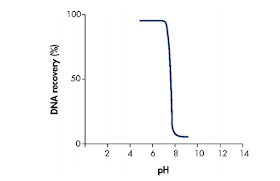What is Gel Extraction?
Gel Extraction or Gel Isolation is a technique used to excise and extract out the desired DNA fragment of interest after the agarose gel electrophoresis.
Why is it done?
Gel Extraction is used to purify the desired DNA fragment from unwanted materials, generally used to purify Restriction Digests, PCR Amplicons, etc.
Procedure:
Following steps are involved in the Gel Extraction:
Principle of Gel Extraction / Nucleic Acid Purification
Most of the commercially available kits uses spin columns for efficiently purify the DNA from agarose gel or from the aqueous solutions. Upto 10ug of the DNA can be easily purified with considerable recovery using the spin columns.
Guanidine HCL or Guanidine Isothiocyante is the widely used chaotropic salt.The adsorption of DNA to the spin column membrane occurs at higher chaotropic salt concentration, as the salt modifies the structure of water.
Adsorption of DNA to the membrane is also depended on pH. 95% adsorption at pH <7 .5.="" before="" column="" if="" is="" loading="" of="" ph="" solution="" spin="" the="" to="">7.5, a small amount of 3M sodium acetate pH 5.0 can be added to bring the pH below 7.5.
Elution:
Gel Extraction or Gel Isolation is a technique used to excise and extract out the desired DNA fragment of interest after the agarose gel electrophoresis.
Why is it done?
Gel Extraction is used to purify the desired DNA fragment from unwanted materials, generally used to purify Restriction Digests, PCR Amplicons, etc.
Procedure:
Following steps are involved in the Gel Extraction:
- Run DNA on Agarose Gel Electrophoresis, Excise the desired band after electrophoresis run.
- Dissolve the DNA containing excised gel
- Bind DNA to Silica Column
- Wash the Bound DNA
- Elute the DNA from column
Principle of Gel Extraction / Nucleic Acid Purification
Most of the commercially available kits uses spin columns for efficiently purify the DNA from agarose gel or from the aqueous solutions. Upto 10ug of the DNA can be easily purified with considerable recovery using the spin columns.
Guanidine HCL or Guanidine Isothiocyante is the widely used chaotropic salt.The adsorption of DNA to the spin column membrane occurs at higher chaotropic salt concentration, as the salt modifies the structure of water.
Adsorption of DNA to the membrane is also depended on pH. 95% adsorption at pH <7 .5.="" before="" column="" if="" is="" loading="" of="" ph="" solution="" spin="" the="" to="">7.5, a small amount of 3M sodium acetate pH 5.0 can be added to bring the pH below 7.5.
 |
| pH dependence of DNA adsorption to Spin Column membranes. |
Elution:
Elution efficiency is depended on the salt concentration and the pH of the elution buffer. Elution efficiency is higher under basic condition and at low salt concentration. Low salt elution buffer 10mM Tris.Cl or Water can be used for elution. While using water for elution, pH should be with in 7.0 - 8.5.
DNA yield & Concentration:
DNA yield depends on these major factors:
1. Volume of Elution Buffer
2. The way elution buffer is applied to the column
3. Incubation of elution buffer on column
Tips Improving Yield of Gel Extraction:
DNA yield & Concentration:
DNA yield depends on these major factors:
1. Volume of Elution Buffer
2. The way elution buffer is applied to the column
3. Incubation of elution buffer on column
Tips Improving Yield of Gel Extraction:
- TAE buffer is preferred over TBE if the gel extract is used for downstream enzymatic application.
- DNA recovery may be higher in TAE compared to TBE.
- Small DNA fragments give higher recovery compared to larger fragments.
- Higher recovery is observed when binding step is done at slow centrifugation speed.
- Incubating the elution buffer in column for upto 5 minutes can increase the yield.
No comments:
Post a Comment